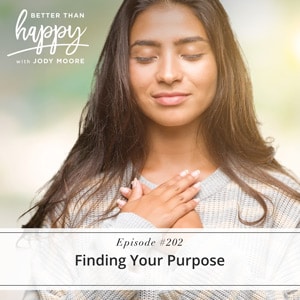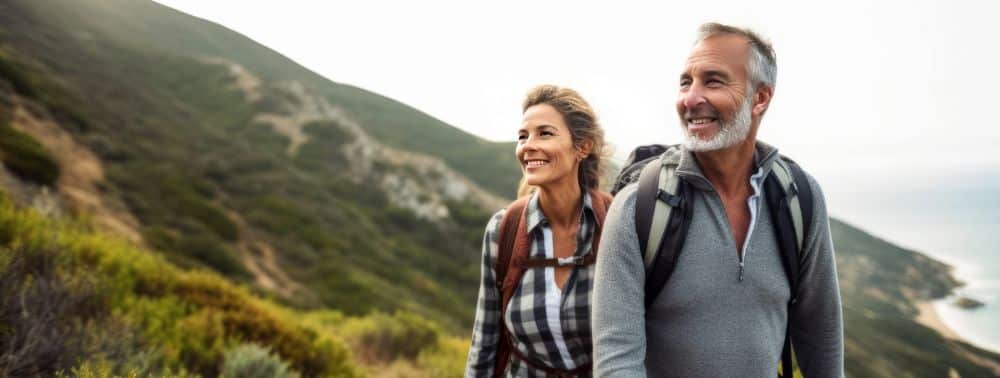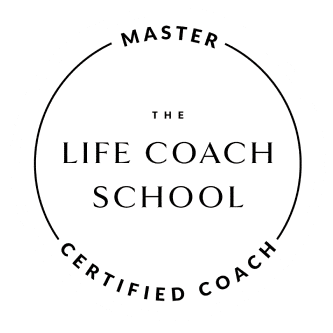Podcast: Play in new window | Download

We all have a different idea of what our purpose in life is, what it means, and how to start doing it – but there is one thing we all have in common: a deep desire to contribute and make a difference. First, I’ll start by saying that nobody just finds their purpose in life. There isn’t one purpose for each person and we just have to find it. There’s a little more to it than that.
Join me on this episode as I explore the idea of choosing and creating your purpose. You’ll discover how to explore the many things you could dedicate yourself to and how to choose one, or more, without listening to all the reasons your brain will provide for why it should be easier than this and you should quit now.
Join me for the next ASK JODY ANYTHING! Come with your biggest challenge or question. Leave with answers and tools. Grab your spot today!
What You’ll Learn on this Episode:
- Why there is no one thing you can do during this lifetime that will make you a more worthy human in the eyes of God.
- What makes the idea of finding your purpose on this earth over choosing it totally misleading.
- Why you might realize your purpose in an area you’re not even particularly passionate about.
- How my clients actually block themselves from discovering their purpose.
- Why time spent on yourself rather than the “greater good” is never time wasted.
- How your brain can easily put itself in between you and creating your purpose in life.
- Why curiosity and putting yourself out there will get you to your purpose.
Mentioned on the Show:
- Come hang out with me in Seattle at Better Than Happy Live! I’ll be there in June to spend a whole day with you, give you a taste of coaching, and record a live podcast all about how to create a deliberate future.
- Your Elusive Creative Genius – Elizabeth Gilbert’s TED talk
- Join me for the next Ask Jody Anything coaching call!
I’m Jody Moore and this is Better Than Happy, episode 202, Finding Your Purpose.
This podcast is for people who know that living an extraordinary life is not easy or comfortable. It’s so much better than that. This is Better Than Happy, and I’m your host, Jody Moore.
Hey, everybody, welcome to the podcast. Two hundred and two – I almost want to say, “Two-oh-two”, but I realize that is not proper English. And some of you notice that and get distracted by my improper English and my spelling errors and grammatical errors. And I’m trying; I’m trying to clean it up for all of y’all. Thank you for your help and suggestions.
I really want to thank all of you who have left me a review in iTunes. It helps the podcast to be found by more people as you leave ratings and reviews. And so I really appreciate it. I know it takes a little bit of time out of your day and it’s like one more thing on your list that you’ve got to do. I know it’s inconvenient and I want you to know that I really appreciate it and that I read them frequently and that I’m just so grateful for your feedback.
It’s pretty awesome that I get to do a job where people come to me and – like, with tears in their eyes when I meet people – tell me about how this has changed their lives. And I always tell them, it’s changed my life too. That’s why I’m so passionate about sharing it with others, because of how life-changing.
And so many of these things that, when we hear them, we recognize that they’re true and, I don’t know about you, but I always think, “I think I knew that. I think I understood that at one point in time. I think I just hadn’t articulated it or thought about it in that way. And it’s amazing, right? Life-changing work – but I do also think, “Why didn’t someone tell me this earlier?” Anybody besides me think that?
Anyway, thanks for joining me. Today, we’re going to talk about finding your purpose. I get requests about this topic quite a bit, so I thought, why don’t we do a podcast? We are getting ready to do a whole month of work on this in Be Bold, so if you’re not in Be Bold, I really highly recommend that you join me there. We take everything you’re hearing on the podcast to not only the next level; it’s like we 10X what we’re doing on the podcast because we actually apply it.
We do the work of examining our brains and figuring out how to create the results we want in our life. But, at any rate, I’m going to talk to you today about finding your purpose. And I want to begin by backing up, just a minute, that phrase; finding your purpose.
Why do we think that we have to have a purpose, first of all? I mean, do we need to have a purpose? Do we have a purpose? So, those of us that are members of the church believe that we are here on Earth to get a body, to become like our Heavenly Father, to have experiences that test us and challenge us and help us to grow and change, and that’s our purpose.
So that’s done. We all know our purpose. We don’t have to go find it. We don’t have to find it. We don’t have to search for anything else. We can literally sit on the couch and do nothing, and we’re not going to have the same life experience, it’s not going to be nearly as enjoyable, it’s probably going to be actually really boring and have its own set of challenges if we do that, but we really don’t have to go do anything in order to prove ourselves in some way, in order to be valuable, in order to be worth the space we’re taking up here on earth. You genuinely don’t.
I really want to begin with you understanding that, at least intellectually understanding that, because otherwise, what we’re chasing is this feeling and this understanding that we are worthy and valuable and whole, worthy of love, worthy of connection, worthy of being here on the planet. And that already exists. There’s nothing that you can do that will create that. You have to just choose to understand that intellectually. So I want to begin with that.
However, that said, human beings do have a basic innate need or desire to contribute in the world, to feel like we are giving back in some way, to feel like we are part of something bigger than ourselves, that we are doing something that is worthwhile, that is contributing to the common good or the greater good. All of those things are really healthy, natural, human desires.
How many people do you hear talk about what they want to do and, in the end, it almost always boils down to, I really just want to help people? A lot of people feel that way. There’s a few… You know who you are, I love you too, that are like, “I’m not really a people person.” That’s all good.
But most people innately want to help people. And even if you don’t enjoy working with people directly, there’s something that you enjoy doing that contributes to our society and to people as a whole. So that is a natural need.
Now, I saw a really beautiful example of this that I wanted to share. It was Christmas time. My family and I were downtown here in Spokane, Washington and we were at a pizza place downtown. We were eating – we had ordered our food, I should say. It hadn’t come yet, so we’re waiting at the table and there was a man and a woman who appeared to be homeless who were sitting inside the pizza place, just kind of getting warm.
And they had a couple of blankets that they had gotten. They had, like, Walmart brand logos on them. So they had these Walmart little fleece blankets and they had, like, holiday prints on them. And they saw all of our children and they came up to us and said, “Would you guys like these blankets?”
They wanted to give these blankets to my kids. And my thought was, okay, A, no, we don’t really need more blankets and I didn’t really want extra stuff around our house. And B, we don’t really need those blankets. And if this couple didn’t need them, I was sure that there were other people who really did need them much more than my kids, just because my kids were excited about the holiday print on the fabric, and I knew they would get over that in like a day.
So my initial reaction was to say, “No, we don’t really want those blankets.” But I saw this man and this woman and I saw that they wanted to give something to someone. They wanted to make someone’s day. They wanted to contribute. They wanted to feel like they were doing good by someone. And so this was an opportunity for them to do that.
And so we, graciously, accepted their blankets and my kids were so happy and they loved it. They loved watching my kids be so happy. And then we took those blankets and donated them through the kids’ school to a cause that needed them more than us. But I was watching this whole scene and just thinking about how amazing it is that the human spirit, no matter what our situation, we have this desire and this drive to want to contribute and give back.
Now, many times in our lives, we are giving a lot. In fact, many of you that I work with are feeling overwhelmed because you’re giving so much. You’re raising children. Maybe you’re working or your spouse is maybe working and you’re trying to juggle all that comes with raising a family and supporting a family and figuring out what each other’s roles are and supporting one another and getting along and still meeting your own needs. There’s times when that is really intense.
And then there’s other times when things feel a little bit quieter and there’s more of a lull. So I see this happen primarily with my clients who are empty-nesters, whose children have maybe just left the house recently, and now they find themselves not really sure what their purpose is. Or maybe their kids are all older, maybe they’re all in school and they just don’t feel like their kids need them in the same way. I think your kids always need you, but not in the same way, maybe not the same demands on your time that their used to be.
And so, this feeling of, like, “What is my purpose?” I see this a lot at retirement as well, right, “What am I supposed to do now?” It can happen at other times, but that’s where I tend to be coaching on it the most commonly. So it’s natural and normal. At the same time, I love to coach people through, you know, you don’t have to do anything to prove anything to anyone or yourself.
Now, the other thing I want to mention about this term, finding your purpose, I almost – again, I always debate, like, do I call this podcast what I want to call it and the term that I want people to be thinking about, or do I call it the term that they’re going to notice in the list of podcast names and say, “That’s the one I need.”
So I called it Finding Your Purpose because that’s what you guys all call it when you’re talking to me about it. But that word, “Find,” I think is kind of misleading. If I have to find my purpose, it implies that, first of all, I have a specific purpose and it’s missing and it’s outside of me and I need to go and look for it, and that whatever I find could be the right thing or it could be the wrong thing.
I’ve got to find my purpose – it sounds so heavy. It sounds so serious. It sounds so, like, how am I going to know if I find and how am I going to know where to find it? And I think this is why so many of you feel so overwhelmed and lost with this question, because you’re looking for something outside of you.
But I don’t think that purpose is something that you need to go find. I think purpose is something that you just get to decide and choose and these are some of the things that I see my clients do that keep themselves blocked and stuck from creating and choosing that purpose. But let’s start thinking about it instead of finding our purpose. Let’s think about it as choosing or creating our purpose. How does that sound?
So, the first thing I see my clients do that keeps themselves stuck is that they think that their purpose needs to be something really noble. It needs to be something really service-based that is giving in some way. And I talked about this earlier that we have that basic innate need and desire to contribute in the world. But there’s times in your life when you are doing that and there’s times that you’re doing something just because it sounds fun to you.
And maybe that turns into something that you contribute in the world in some way and maybe not. Maybe it’s for your own enjoyment, your own growth, and your own development. And all of that is fine. Please don’t tell yourself that there’s something wrong with whatever you’re interested in or curious about, that it’s not noble enough, that it’s selfish, that it’s not giving back. Maybe there’s a time in your life to just do something because it sounds fun.
The other thing I see people do is, again, it kind of goes along with that idea that we’re looking for, trying to find our purpose, is we’re praying, we’re asking the Lord to help us find it and it feels like we’re not getting an answer. It feels like silence.
I just spoke at a Stake Relief Society Conference up in the Seattle area and I shared this idea with them that maybe the Lord doesn’t really care. I don’t mean he doesn’t care about you. He cares about every one of us. But I’m saying, maybe there’s several dozen things that you could go do with your time now, and the Lord wants you to just pick one and go all in.
Maybe he doesn’t have a set plan of one specific thing that you need to be doing. And when we use that term, “I want to choose the right, I want to do what the Lord wants for me,” I think that can be very useful if we’re choosing right versus wrong. But if we’re talking about how you’re going to spend your time, there could be so many things that are right for you to do, and maybe the Lord purposely wants you to make that decision and own that decision and go all in on it.
Now, I want to warn you what’s going to happen when you do this. When you decide to pursue something – by the way, it doesn’t have to be big, it doesn’t have to be major. It could just be something small that you’re curious about. We’re going to talk about that in just a minute. But when you decide to go and pursue something different, to try something new, to put yourself out there in a way that you haven’t done before, or just to go learn and try to do something that you haven’t done before, your brain is not going to like it.
The brain doesn’t want to do new things. The brain doesn’t want to do anything different than what we’ve been doing because, “What we’ve been doing has kept us alive just fine. And it’s comfortable and we’re good at it and we can delegate all the things we’ve been doing to the lower-brain. We don’t even have to really think about it too hard, so why would we want to mess any of that up?” is what your brain says; that we should just keep doing the same things. So as soon as you try to go outside the cave into the field, the brain is not going to like that and the brain’s going to react, and then you’re going to feel negative emotion.
Now, you may feel afraid. You may feel embarrassed. You may feel stressed. You may feel confused. You may feel overwhelmed. All of these feelings are the brain saying, “Why are we doing something different? It’s a terrible idea.”
So knowing that that’s what your brain is going to do, I hope, will just give you the understanding that you need to keep moving forward anyway. Don’t make it mean, “Oh, this isn’t the right thing.” This is what I see my clients do. They’re like, “Well I was pursuing this one thing, but then I just felt so overwhelmed, I thought, maybe that’s not it.” No, it doesn’t mean that’s not it. Remember, there is no “it” anyway, but this is just what your brain’s going to do if you’re going to try something new.
And again, as kids, we’re used to this because we have to go to a new grade every year and we have to go to new schools and we have to meet new friends and we go do new things and we try new things all the time. But as we become adults, we stop trying new things, we get into our routines and our habits, and then our brains become less adaptable, less resilient, so you’re going to notice the negative emotion. But if you make it mean this isn’t my purpose, this isn’t my thing, you’re just going to shut yourself down every time.
If you make it mean, oh this is because I’m trying something new, this is where the growth comes in. The discomfort is the way that we grow. So that’s all this is, and I’m going to keep moving forward anyway.
So when I decide to try something new, I like to give myself a certain point at which I can revisit my decision, otherwise I know I’m going to want to revisit my decision all along the way and I’m going to second guess it and I’m going to question myself, I’m not going to go all in, which is going to prevent my success, of course.
So, for example, some of you have heard me tell this story before, but about five or six, I guess, about five years ago, six years ago, I decided I wanted to teach Turbo Kickboxing. I’ve gone to Turbo Kickbox at the gym for many years for years before that and I love that class. It’s created by Chalene Johnson and it’s super fun. And I had the best instructors ever and I was like, “I want to do that. I want to be like those instructors. I want to teach Turbo Kick.”
And so, I got certified. Of course, it was, like, right in the middle of pregnancies. I had had a miscarriage right before I got certified and then I got pregnant again and my brain kept being, like, “Maybe this isn’t a good idea. You’re pregnant, you’re not in great shape. It’s kind of hard to jump around. You don’t feel very good.”
I’d never taught classes at the gym before, so even though I got certified in Turbo Kick, I had a whole learning curve about how to cue properly, to help people be able to follow along. And anyway, I told myself, listen, I’m going to keep doing this until I get a job somewhere and I teach Turbo Kick for at least six months, and then I can revisit this decision.
So I did. I went through the certification. I found a mentor because I realized I need someone to mentor me, to teach really how to teach. And I did. And then I had to apply to many different places before I was able to get a job, but I did finally get a job at a gym and I taught Turbo Kick for about a year. And then I was like, okay, now I get to reassess.
So I’m so glad I did that because that was challenging for me. I was not – I’ll be honest, I was not a great turbo Kick instructor. I was fine. Like, I was following the beat and everything, and I could cue just fine, but I wasn’t as amazing at it as some of the people I know. And ultimately, what I realized is it’s just not my thing, probably.
Like, I still like going to those classes and I like being a participant in classes, but teaching it was just not my thing. But I’m so glad that I gave myself that endpoint at which I needed to get to before I revisited that decision, because now, I’ve done that. I don’t have to keep thinking, remember how I wanted to do that and I never did?
I know so much more now about the body, about nutrition, about exercise science than I did before, and I have that experience and I grew from that experience and I met people through that experience, and I’m so glad that I did it. So, give yourself an endpoint at which you will revisit the decision.
I did the same thing when I started my coaching practice, except that when I got to that point, I decided to keep going because I loved it so much. So, sometimes you’ll keep going, sometimes you may decide you’re done with that part of your life now, but just don’t listen to your primitive brain that’s like, “This is scary and hard and overwhelming and we don’t know what to do and where to go.” Be willing to work through all of that. That is how we grow.
Alright, now, I want to just come back to one other point before we wrap up this topic, which is that we tend to think that our purpose is going to be something that we’re really passionate about. You hear people talk about things they’re passionate about and the way they talk about it is, like, it’s so obvious that that’s their thing. That’s what they were called to do. That’s what they feel like they were made to do. That’s what they love doing and they’re really good at it, oftentimes.
But I want you to know that I think that is the exception. I think people finding something that they love to that extent that they feel that committed to and that they then have natural skills and abilities for is pretty rare. I don’t think it happens that way for most people.
Elizabeth Gilbert talks about this in her TED Talk when she says that someone wrote to her saying, “Hey, this whole thing you talk about with finding your passion and your purpose sounds really nice, but what if you don’t have one? Because I don’t seem to have one. It seems like it should be really obvious and I don’t have one.”
And that’s when she realizes and she creates this concept of the hummingbird, that there are jackhammers and there are hummingbirds. And jackhammers are people that know exactly what they want to do and they will do it at all costs and they’re jackhammering in that one spot, which can have its benefits. But also, it can be irrational. It isn’t always necessarily the best way.
Then we have hummingbird people that take a little bit from one tree and then they fly away and they take a little bit from another tree, and they’re more dabbling in different areas, they’re definitely more well-rounded, it doesn’t look like jackhammering in one spot. It looks like following your curiosity. I’m a little curious about this area. I think I want to explore and learn there. I’m a little curious about this area.
Now, again, this is not the same as walking away from walking away from something because of the negative emotion. But what I did with my Turbo Kickbox class was like a hummingbird experience as opposed to a jackhammer experience.
And I think that the reason so many people that I talk to tell me that they just don’t know what they want to do or what their purpose is or what they’re passionate about is because they’ve been ignoring all those little hummingbird curiosities that come up for so long that they stopped listening to them. The brain maybe even stopped offering them. We certainly lost the skill of being able to hear it.
So you have to be willing to sit in the discomfort of not knowing what you want to do in order to hear it again. And you have to just listen to the subtlest little curiosity and be willing to follow where it goes.
I like to do some journal prompts on occasion if I want to really explore what’s happening in my head. I might do a journal entry on what I really, really, really want is this… What I secretly think I could be amazing at is… If I knew for sure I wouldn’t fail, I would try…
So be willing to try things. Be willing to put yourself out there. Be willing to be uncomfortable and then start listening to the little voice of curiosity that comes up in your mind. Telling yourself that you don’t know is a sure way to shut it down. When you think the thought, “I don’t know,” you will not be able to access the answers.
You have to tell yourself, “Of course I know.” You have to remember that there’s no rush to figure it out. You have to be willing for it to take as long as necessary and sit in the discomfort. But instead of, “I don’t know,” how about just, “I don’t know yet. I’m in the process of figuring that out.”
By the way, the best way to figure it out is just to go try something. Go try anything. Go contribute in some way in your community. Go take a class that you’re interested in. Take an online course somewhere. Sign up for something. Whatever you have the slightest bit of curiosity for, follow that curiosity and see where it takes you. This is how you create a life of purpose.
Alright, thanks for joining me today, you guys. Don’t forget that if you have a question for me, you’re always welcome to join me on Ask Jody Anything. This is a call that I only do on occasion, so go sign up before you miss it. But I would love to take care of you. I would love to answer your personal question about what you’re going through personally, any problem, any challenge, any question, any goal that you’re pursuing that you’re stuck on, bring it to Ask Jody Anything and I will hook you up.
Go to jodymoore.com/askjody and I’ll see you there.
Enjoy the Show?
- Don’t miss an episode, subscribe via iTunes, Stitcher or RSS.
- Leave us a review in iTunes.
- Join the conversation by leaving a comment below!







